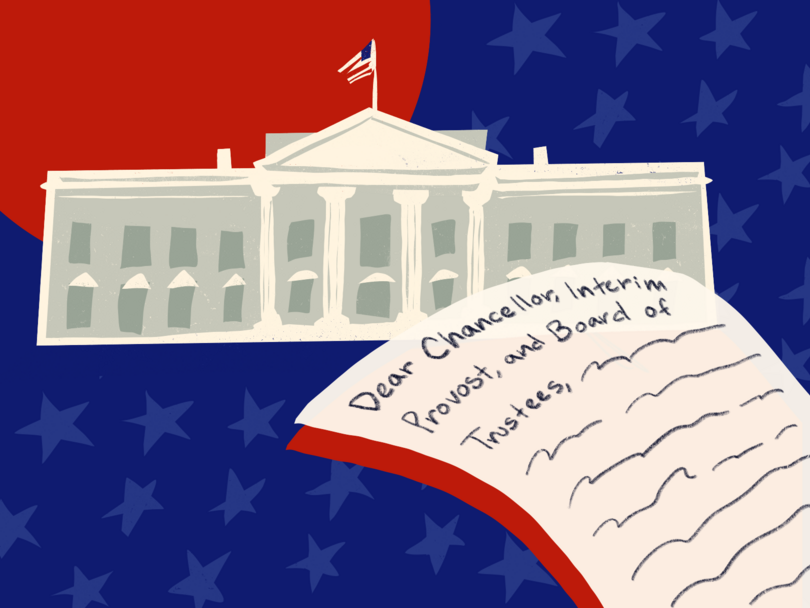Professors encourage SU to ‘stand firm’ after Trump’s academic demands

As of Wednesday evening, over 130 SU faculty and staff have signed a letter encouraging the university to “stand firm” and not concede to Trump’s demands on academic institutions. The letter follows Trump's recent executive order to dismantle the DOEd. Flynn Ledoux | Illustration Editor
Get the latest Syracuse news delivered right to your inbox.
Subscribe to our newsletter here.
As of Wednesday evening, over 130 Syracuse University faculty and staff members have cosigned a letter sent to SU administrators, urging the university to “stand firm” and resist the Trump administration’s demands on academic institutions across the United States.
The letter follows Columbia University’s decision to comply with the president’s demands on Friday.
SU professor Harriet Brown, the letter’s lead author, said she grew increasingly anxious as she watched Columbia “cave” to the White House. Desperate to take action, Brown decided to author a letter to SU’s chancellor, provost and board of trustees, encouraging them not to comply with the administration’s demands.
“If the federal administration is coming for institutes of higher education, agreeing to a long list of demands will not stop them,” the letter reads. “… on the contrary; these actions are likely to damage the university, perhaps irreparably.”
Following its Friday decision, Columbia announced it would create a new internal security unit consisting of 36 “special officers” responsible for arresting and removing people from campus, the New York Times reported. The university also banned students from wearing masks in “disruptive settings” on campus — a hallmark of nationwide college protests over the past year — and said it will adopt a formal definition of antisemitism.
Brown, who teaches magazine, news and digital journalism, said her colleagues at Columbia have been “distraught” over the university’s new plans. Initially, she sent the letter to a few colleagues, who signed and distributed it further.
SU Chancellor Kent Syverud responded within 15 minutes of receiving the letter, The Daily Orange confirmed.
“Thank you Harriet. Received, read, and will share with our board. I’m grateful for this work” Syverud wrote.
Margaret Susan Thompson, a SU history professor and signee of the letter, said she appreciated the chancellor’s acknowledgement, but challenged the university’s repeated commitment to “adhering to the law” as it faces pressure from federal agencies.
Thompson grew up during the Red Scare and Civil Rights Movement, and watched her father, then a professor at the University of Florida, face backlash for supporting and advocating for academic freedom. She said she never imagined she’d see similar threats to universities to the ones her father encountered.
When her father advocated for racial equality and desegregation in the classroom in the 1960s, Thompson noted that, by the legal standards of the time, his actions were “illegal.” As she prepares material for her courses on right-wing extremism and women’s history, Thompson said she remains aware that some federal agencies view her teaching as unimportant — or even as violations of the law.
“What does (Syverud) consider the law in this case?” Thompson said. “Because President Trump has signed so many executive orders, does he regard those as the law? Many of them, quite frankly, are unconstitutional.”
At these pivotal moments in history, Sarah Pralle, an SU political science professor, said fear and uncertainty are normal. Brown emphasized this, adding that authoritarian governments often use fear to suppress academic institutions.
Pralle, who teaches a course on social movements, said the demands placed on Columbia and other universities highlight the extent Trump is willing to go to control discourse in higher education. The “chilling effect” of intense police presence and government oversight on students’ right to protest, Pralle said, is typical in similar historical moments.
“It’s really a part of their playbook,” Pralle said. “… any institution that’s still committed to telling the truth, they go after.”
Thompson said the letter is a commitment from faculty to face these pressures together, and encouraged a similar commitment from administration. With a unified effort, she said the university will have a better chance at standing up to Trump’s demands, should he turn his gaze to SU. On Jan. 24, The Chronicle of Higher Education listed the university as a “possible target” for federal investigation.
“We appreciate our colleagues’ commitment to Syracuse University and, more broadly, higher education,” Sarah Scalese, an SU spokesperson, wrote in a Wednesday evening statement to The D.O. “As Chancellor Syverud and Provost Agnew have reiterated in various forums, the University remains focused on advancing its academic mission, upholding its core values, and being welcoming to all.”
SU is not included in the Office of Civil Rights’ investigation of 60 universities for alleged “antisemitic discrimination and harassment.” On March 6, the university informed students and faculty it will review SU programming and curriculum for compliance with federal diversity, equity, inclusion and accessibility regulations.
“We are not going to do some of the things you’re seeing elsewhere,” Syverud said during last week’s University Senate meeting. “So we’re not going to have large-scale layoffs. We’re not going to have across-the-board hiring freezes. We’re not going to have deep budget cuts or other drastic measures in graduate programs.”
Syverud also acknowledged the difficulty of predicting the federal government’s next steps, but told senators he expected to provide a more comprehensive update once SU’s Office of Diversity and Inclusion completes its reviews.
Amid this uncertainty, Brown said solidarity between universities and professors across the country is crucial to the success of their movement. After sending the letter to colleagues at Boston University, Brown said they’ve been inspired to draft their own.
Pralle also hopes for widespread unity among professors. She said without large-scale efforts to resist Trump’s orders, the federal government will be able to “pick off institutions one by one.”
“What we have to do as professors is not back down,” Thompson said. “We should be able to count on the university administration standing behind us, not necessarily agreeing with what we say, but agreeing with our right to say it.”





